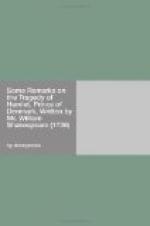Ophelia’s Description of Hamlet’s Madness, does as much Honour to our Poet as any Passage in the whole Play, (p. 261, and 262.) It is excellently good in the Pictoresque Part of Poetry, and renders the Thing almost present to us.
Now I am come to mention Hamlet’s Madness, I must speak my Opinion of our Poet’s Conduct in this Particular. To conform to the Ground-work of his Plot, Shakespeare makes the young Prince feign himself mad. I cannot but think this to be injudicious; for so far from Securing himself from any Violence which fear’d from the Usurper, which was his Design in so doing, it seems to have been the most likely Way of getting himself confin’d, and consequently, debarr’d from an Opportunity of Revenging his Father’s Death, which now seem’d to be his only Aim; and accordingly it was the Occasion of his being sent away to England. Which Design, had it taken effect upon his Life, he never could have revenged his Father’s Murder. To speak Truth, our Poet, by keeping too close to the Ground-work of his Plot, has fallen into an Absurdity; for there appears no Reason at all in Nature, why the young Prince did not put the Usurper to Death as soon as possible, especially as Hamlet is represented as a Youth so brave, and so careless of his own Life.
The Case indeed is this: Had Hamlet gone naturally to work, as we could suppose such a Prince to do in parallel Circumstances, there would have been an End of our Play. The Poet therefore was obliged to delay his Hero’s Revenge; but then he should have contrived some good Reason for it.
His Beginning his Scenes of Madness by his Behaviour to Ophelia was judicious, because by this Means he might be thought to be mad for her, and not that his Brain was disturb’d about State Affairs, which would have been dangerous.
Page 263.
Enter King, Queen, Rosincrantz, Guildenstern, &c.
The King in this Scene, seems to be but half perswaded that Hamlet is really mad; had he thoroughly believed it, it was to no Purpose to endeavour to sound his Mind; and the shortest and best Way, and what, methinks, the King ought most to have wished for, was to have had him confin’d; and this was an excellent Reason to give the People for so doing.
The Queen seems to have no Design or Artifice in relation to her Son, but mere Affection; which, considering all Things, one would little expect from her.
The Account of the Embassy to Norway, was necessary towards the Introduction of Fortinbrass, in the Sequel, whose coming in at the Close of the Play winds up all very naturally.
Polonius’s Character, (p. 267, 268.) is admirably well kept up in that Scene, where he pretends to have discovered the Cause of the Prince’s Madness, and would much deserve Applause, were such a Character allowable in such a Piece as this.




